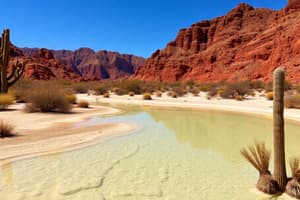Podcast
Questions and Answers
What is the characteristic of a Tropical Desert climatogram?
What is the characteristic of a Tropical Desert climatogram?
- Temperatures range from freezing to around 70F
- Temperature ranges from very much below freezing
- Rainfall all year with warm temperatures
- Consistent high temperatures with little rain (correct)
What is a Temperate Desert climatogram's temperature range?
What is a Temperate Desert climatogram's temperature range?
Freezing to around 70F
Define the temperature range of a Polar Desert climatogram.
Define the temperature range of a Polar Desert climatogram.
Below freezing to well above freezing (up to 80F)
What describes the conditions of a Tropical Grassland climatogram?
What describes the conditions of a Tropical Grassland climatogram?
What is the major characteristic of a Temperate Grassland climatogram?
What is the major characteristic of a Temperate Grassland climatogram?
What describes the climate of a Polar Grassland climatogram?
What describes the climate of a Polar Grassland climatogram?
What is a characteristic of a Tropical Rain Forest climatogram?
What is a characteristic of a Tropical Rain Forest climatogram?
What are the conditions of a Temperate Deciduous Forest climatogram?
What are the conditions of a Temperate Deciduous Forest climatogram?
Define the main features of a Polar Evergreen Coniferous Forest climatogram.
Define the main features of a Polar Evergreen Coniferous Forest climatogram.
What does Taiga refer to?
What does Taiga refer to?
What is the Tundra?
What is the Tundra?
What characterizes Temperate Rain Forests?
What characterizes Temperate Rain Forests?
What defines Temperate Grasslands?
What defines Temperate Grasslands?
What is the Open Ocean referred to as?
What is the Open Ocean referred to as?
What is Benthos?
What is Benthos?
What are Upwellings?
What are Upwellings?
Flashcards are hidden until you start studying
Study Notes
Climatograms Overview
- Tropical Deserts: High consistent temperatures, minimal rainfall.
- Temperate Deserts: Temperature range from freezing to 70°F, primarily dry conditions.
- Polar Deserts: Temperature fluctuations from below freezing to 80°F, very low precipitation.
- Tropical Grasslands/Savanna: Warm temperatures (60-70°F), dramatic wet and dry seasonal variations.
- Temperate Grasslands: Temperature range from below freezing to 90°F; significant fluctuations in both temperature and rainfall.
- Polar Grasslands: Extremely low temperatures with minimal rainfall.
Forest Types
- Tropical Rainforest: High constant temperatures with year-round rainfall, seasonal variations in intensity.
- Temperate Deciduous Forest: Large temperature range above freezing, year-round fluctuating rainfall, identifiable wet and dry seasons.
- Polar Evergreen Coniferous Forest: Broad temperature range, consistent year-round rainfall with seasonal variations.
Boreal Ecosystems
- Taiga: Also known as boreal forest, characterized by conifer trees, found in colder climates and higher latitudes/altitudes; low biological diversity.
- Tundra: Treeless plains with harsh climates and low rainfall; includes arctic tundra at high altitudes and alpine tundra at high elevations, some areas have permafrost.
Temperate Regions
- Temperate Deciduous Forest: Warmer than boreal forests, dominated by tall deciduous trees; significantly altered by human activity, deep shade limits vegetation.
- Temperate Rain Forests: Found in moderate temperatures with over 350 cm of precipitation annually; dominated by evergreen conifers; experiences mild, wet winters and low species diversity due to shade.
- Temperate Grasslands: Areas too dry for forests but too moist for deserts; dominated by grasses, rich soil, and high diversity of large animals; naturally maintained by fire.
Oceanic Zones
- Open Ocean (Pelagic Region): Water in all oceans, low in nitrogen and phosphorus leading to low productivity and diversity of algae; supports various large animal species at low densities.
- Benthos: The ocean's bottom, reliant on dead organic matter for food, lacks photosynthetic plants due to darkness.
- Upwellings: Nutrient-rich deep waters that arise to the surface, promoting significant algae growth due to the upward flow of nutrients from dying surface organisms.
Studying That Suits You
Use AI to generate personalized quizzes and flashcards to suit your learning preferences.




